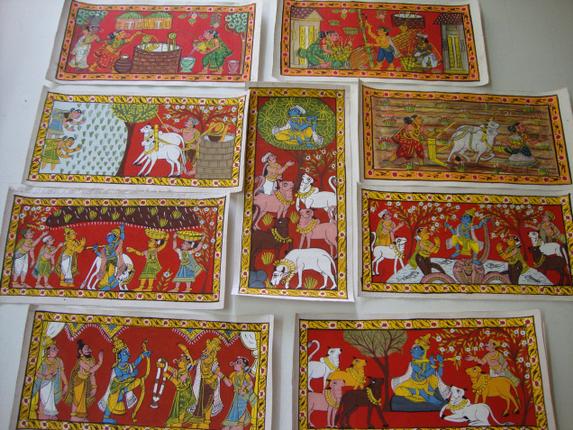
An 18-year-old is using his skills to revive the fading cherial heritage of Warangal
At the first glance, 18-year-old Vinay Kumar looks like any other teenager, with lofty dreams in his eyes. But once he starts speaking while rolling out scrolls of painting or cherial, a strange passion takes over. Coming from the youngest generation of the only family in the Cherial village of Andhra Pradesh to continue doing this art, Vinay’s passion is heartening, for, in his hands now lies the fate of the more than 500-year-old art form.

Cherial is located in Warangal district. Here, these paintings, which depict scenes from the epics and local legends, form an integral part of the story-telling tradition. Since the paintings are mostly three-feet-wide and 60-feet-long, unrolling the scroll bit by bit, while narrating the story, may sometime take weeks or even a month. Music adds further drama to the whole spectacle.
“Ever since I can remember, storytellers used to come to our house and place order for a scroll, and depending on what they want, my father or uncle used to paint. A cherial painting lasts for 150 years, so we won’t get the same customer again. Before 1995, my father used to get two-three orders from storytellers every year; now we hardly get any in a year,” Vinay, who is also involved in the family art, said.
A craft that has been passed down generations, he said that although cherial has been a family tradition since the 16 Century, his grandfather was not very keen on his sons learning it because it did not pay much. “But one day, he was struck by paralysis, and because there were pending orders, my father and his elder brother had to fill in his shoes and do the painting.”
Apart from the expert handiwork, the beauty of a cherial painting is in its all-natural elements. The canvas is khadi cloth, on which a mixture of tamarind seed powder, white clay, and rice starch is applied thrice to make it stiff. After that, inglikum, which is also an Ayurvedic medicine according to Vinay, is applied for the red background colour. Then the sketch of the bodies are made and filled with natural colours, ornaments come next, and finally a black outline is drawn to make the figures stand out.
“We get the white colour from burning sea shells, the black from lamp soot, the blue from indigo leaves, yellow from stone, and others by mixing the colours,” the young, award-winning artist elaborated.
Although cherial has a Geographical Indications (GI) tag, and Vinay’s father, D. Vaikuntam, is a national award-winning artist whose work is appreciated in exhibitions held in and outside the State, there continues to be a looming threat to its sustainability. “In 1970, the State department of handicrafts approached our family to do cherial for the general public, and not just storytellers, for it to sustain, and since then we have been doing smaller scrolls, 6×12 inches, for decorative purposes,” Vaikuntam said.
Depicting one scene in the small scrolls cost about Rs. 500, but the price increases with greater intricacy. For storytellers, the price is quoted per metre of work.
“Over the years we have further innovated, and have painted on ornament boxes, envelopes, letter heads, even on a sari, which people have appreciated. We also do different colour schemes and take up themes like the village life, other than the epics.”
But Vinay has bigger dreams. Supported by the Crafts Council of Andhra Pradesh, he is now studying fine arts in a design school. “No other job for me, this is what I want to do. I want to take cherial across the borders of our country, and maybe open a gallery one day. Our first preference will always be the storytellers, but with changing times our market has changed and I would like to innovate in order forcherial to thrive,” he smiles.
source: http://www.thehindu.com / The Hindu / Home> Features> Friday Review> Art / by Azera Parveen Rahman / September 18th, 2013